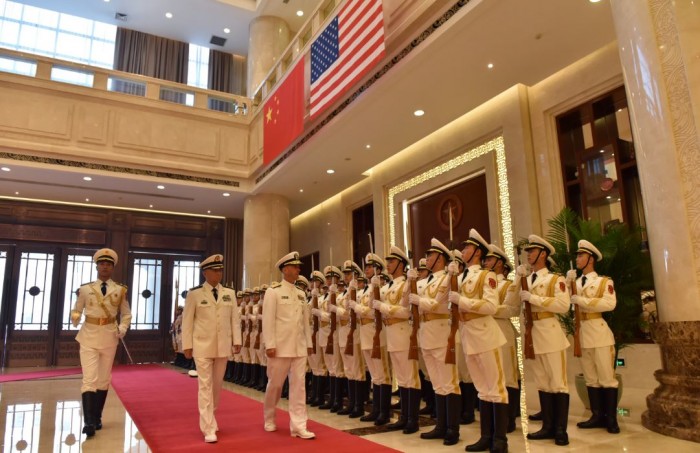Media Report

- The Washington Post reports: "On a visit to the northern Chinese port of Qingdao, Chief of Naval Operations Adm. John Richardson said he backs more exchanges, but added, 'In this area we must judge each other by our deeds and actions, not just by our words.' 'I am supportive of a continued and deepening navy-to-navy relationship, but I will be continuously reassessing my support conditioned on continued safe and professional interactions at sea,' Richardson said, according to a Navy news release....He said the U.S. Navy would continue to conduct 'routine and lawful operations' around the world, including in the South China Sea, in order to protect 'the rights, freedoms and lawful uses of sea and airspace guaranteed to all.'"
- The Associated Press reports: "In an apparent attempt to head off large-scale street demonstrations, Chinese state newspapers have criticized scattered protests against KFC restaurants and other U.S. targets sparked by an international tribunal's ruling that denied Beijing's claim to virtually the entire South China Sea....In China, protesters have gathered in recent days outside KFC restaurants in several cities, unfurling banners and calling for a boycott of the U.S. chain. Reports on social media say customers have been accused of being unpatriotic and 'losing face for their ancestors.' Such actions interfered with legitimate business and humiliated customers, the official China Daily said Wednesday, echoing an editorial the previous day in the People's Daily, the Communist Party's flagship newspaper."
- The Washington Post reports: "For those who haven't spent time in China's thriving cities, it can be hard to imagine how digitally connected they are. Many still conjure the China of the 1990s, a nation of shoe factories and fake bags, not cutting-edge apps. Outsiders tend to know one thing about China's Internet: It's blocked — no Facebook, Twitter or Google. They imagine a country languishing behind a digital Iron Curtain, waiting, frozen in time, for the fall of the Web's Berlin Wall. The United States wants to believe that the scourge of censorship thwarts online innovation, but China is challenging the idea in ways that frighten and confound....The truth is that behind the Great Firewall — the system of censorship designed to block content that could challenge the Chinese Communist Party — China's tech scene is flourishing in a parallel universe."
Calendar
- 2016-07-19 Philippines says it rejected China offer of talks on South China Sea
- 2016-07-18 China to Close Part of South China Sea for Military Exercise
- 2016-07-17 China's urban air quality improves in first half - ministry
- 2016-07-15 China media again touts plans to float nuclear reactors in disputed South China Sea
- 2016-07-14 China’s actions in South China Sea seen as defying ruling
- 2016-07-13 China on Pace to Meet Economic Targets This Year, Premier Says
- 2016-07-12 Beijing’s South China Sea Claims Rejected by Hague Tribunal
- 2016-07-11 China Intensifies Opposition Ahead of South China Sea Ruling
- 2016-07-10 Beijing to make good on investment pledge at EU-China summit
- 2016-07-08 US Says S China Sea Tribunal Ruling Presents Choice for Asia
News
- The New York Times China Criticizes Street Protests Over Arbitration Ruling
- The Washington Post Top US admiral says China exchanges conditional on safety
- The Washington Post America wants to believe China can't innovate. Tech tells a different story.
- The Financial Times Brussels prepares market economy compromise for China
- The Wall Street Journal China Hyundai Dealers Seek Compensation From Car Maker
- BBC News China's media criticises anti-US protests at KFC outlets as jingoistic
- Reuters U.S. says its forces will keep operating in South China Sea
- The New York Times Skyscrapers' Rise in China Marks the Fall of Immigrant Enclaves
- The Wall Street Journal Stronger Chinese Patent Laws Also Help U.S. Companies
- Reuters Heavy rain disrupts trains, flights in Chinese capital
- Bloomberg Business China Financier Sonny Wu Said to Lead $825 Million AC Milan Deal
- The Guardian 'World's saddest polar bear' exhibited in Chinese shopping centre
- BBC News GE agrees deal with China's Huawei to improve productivity
Commentary
- Foreign Policy: Tea Leaf Nation Report: More Than 100 Chinese Muslims Have Joined the Islamic State
- Brookings Institute Chinese foreign assistance, explained
- The Diplomat International Law Won't Stop China in the South China Sea
- The Wall Street Journal: China Real Time China Warns Off South China Sea Protests
- The National Interest Only America Can Keep a China-India War from Erupting
- The Wall Street Journal The Wisdom of The Hague's South China Sea Decision
- Bloomberg Gadfly China's Pain, India's Migraine
